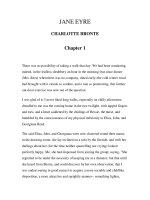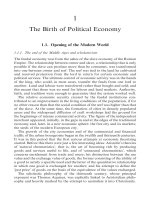230823-1-[5Am. Ielts] - Chapter 1.Pdf
Bạn đang xem bản rút gọn của tài liệu. Xem và tải ngay bản đầy đủ của tài liệu tại đây (8.03 MB, 79 trang )
lOMoARcPSD|18279418
5am.IELTS
Dậy sớm học IELTS
Lộ trình từ A-Z
CHAPTER 1
/>
@5am.IELTS
Downloaded by Linh Nguyen ()
lOMoARcPSD|18279418
ạn!
Rất vui khi đang đọc một cuốn ebook nhỏ xinh xắn này.
Lời đầu tiên, mình - Nguyễn Tiến Vinh, xin gửi lời cảm ơn sâu sắc tới các bạn cộng sự:
Nguyễn Thị Như Quỳnh, Đỗ Mai Hương, Tô Nhã Sen và Lê Quỳnh Anh đã hỗ trợ mình trong
quá trình thực hiện cuốn ebook này.
Chào các b
ốn ebook trên tay các bạn đây là một phần của kế hoạch học IELTS theo lộ trình từ A-Z.
Cuốn sách này nên được sử dụng vào sáng sớm mỗi ngày.
Cuốn ebook này gồm 18 bài (khoảng trên dưới 300 từ) theo chủ đề được trích từ báo, mỗi
bài gồm các hoạt động:
+ Vocabulary: Các từ vựng và cụm từ hay được trích ra từ các bài báo, đồng thời có cả
các phần mở rộng của các từ với mục đích giúp các bạn đọc có thể tiếp cận nhiều hơn tới
kiến thức liên quan.
Các từ vựng và cụm từ chính đều được cho vào quizlet để mọi người tiện học.
Cu
ọc trước từ vựng và cụm từ hay, các bạn sẽ chuyển sang đọc bài báo.
+ Reading: Sau khi h
ạt động listening liên quan tới gap filling, sẽ có 1 audio về bài báo, và các
bạn có nhiệm vụ là điền lại những từ đã được bỏ trống để luyện kĩ năng nghe.
+ Listening: Ho
ộ câu hỏi (part 1,2,3) theo chủ đề đều được đưa vào, các bạn nên soạn
ra và luyện, để cho việc học tốt hơn, các bạn hãy tham gia nhóm 5AM - Dậy sớm học IELTS
để cập nhật các đáp án.
+ Speaking: Các b
ần Writing sẽ chú trọng vào task 2, do đó đề bài task 2 sẽ liên quan tới chủ đề
của bài đọc. Các từ vựng, cụm từ cho Writing task 2 sẽ được cập nhật trên nhóm.
+ Writing: Ph
ất cả các hoạt động cần làm trong cuốn sách này đều được ghi lại rõ ràng trong lộ trình
học IELTS từ A-Z, để biết rõ hơn, các bạn vui lịng vào nhóm 5AM - Dậy sớm học IELTS để
cập nhật lịch và lộ trình, để có thể đạt được kết quả tốt nhất.
Trong q trình thực hiện, khó tránh khỏi các thiếu sót, hi vọng các bạn góp ý để cuốn sách
được hoàn thiện hơn cho các Chapter tiếp theo.
Chúc các bạn kiên trì đi tới cùng và đạt kết quả tốt trong kì thi IELTS.
T
@5am.IELTS
/>Downloaded by Linh Nguyen ()
lOMoARcPSD|18279418
Topic
Life skills
@5am.IELTS
/>Downloaded by Linh Nguyen ()
lOMoARcPSD|18279418
Day 1
Vocabulary highlights
Read several new words/phrases below, make some notes and either
learn them in your own way or click on this link to learn those new words.
/>1. Struggle to do sth: vật lộn, nỗ lực làm gì
2. Put off sth: trì hỗn
= postpone doing sth
Never put off till tomorrow what you can today: việc hôm nay chớ để
ngày mai
3. distraction: sự xao nhãng
Unnecessary distraction: sự xao nhãng không cần thiết
distract sb/sth from sth (v): gây xao nhãng
4. Procrastination: sự trì hỗn
procrastinate (v)
5. In other words: nói cách khác
6. In place of sth: thay vì điều gì
= instead of sth = in lieu of sth
7. An intended course of action: một loạt các hành động được định sẵn
8. Feel overwhelmed: cảm thấy choáng ngợp
9. Drag: làm chậm lại, kéo chậm lại
10. Blow opportunities: đánh mất cơ hội
@5am.IELTS
/>
Downloaded by Linh Nguyen ()
lOMoARcPSD|18279418
Reading activity
Read and make sure you understand the whole article. You may find some other new
words. Don’t worry. Highlight, take some notes and look them up in the dictionary to
understand everything.
Procrastination
If you have so many things to do that you often find yourself struggling to finish
projects and tasks and move on to other stuff, you’re certainly not alone. Studies show
that over 20 percent of the adult population put off or avoid doing certain tasks by
allowing themselves to be overtaken by distractions.
What Is Procrastination?
Piers Steel, the author of the book The Procrastination Equation: How to Stop Putting
Things Off and Start Getting Stuff Done, defines procrastination in this way:
“Procrastination is to voluntarily delay an intended course of action despite expecting
to be worse off for the delay.”
In other words, procrastination is doing more pleasurable things in place of less
pleasurable ones. The end result is that important tasks are put off to a later time.
Signs of a Procrastinator
Procrastinators don’t want to complete their work because they tend to feel
overwhelmed easily and lack focus when they work.
Why Do We Procrastinate?
The reasons vary from person to person. It could be a matter of emotion, which
affects your motivation. It could also be something related to your ability to focus, and
the way you deal with your fears.
Is Procrastination Bad?
Yes, it is. Procrastination is bad. It drags your progress and makes you unable to get
anything done. If you procrastinate, you will lose your precious time and blow
opportunities.
@5am.IELTS
/>Downloaded by Linh Nguyen ()
lOMoARcPSD|18279418
Listening activity
You will hear different audios and then fill words/phrases you’ve heard in the blanks.
If you can’t figure hidden words/phrases out, repeat the audio until you can hear
every single word. After listening to the audio, you can have a look at the reading
activity to check the answer
/>Procrastination
If you have so many things to do that you often (1) ______ yourself struggling to
finish projects and tasks and (2) ________ to other stuff, you’re certainly not (3)
_________. Studies show that over 20 percent of the (4) ________ population
put off or (5) ________ doing certain tasks by allowing themselves to be
overtaken by (6) _________.
What Is Procrastination?
Piers Steel, the author of the book The Procrastination Equation: How to Stop
Putting Things Off and Start Getting Stuff Done, defines procrastination in this way:
“Procrastination is to (7) ________ delay an intended course of action despite
expecting to be (8) _________ off for the delay.”
In other words, procrastination is doing more pleasurable things in place of less
pleasurable ones. (9) ________ is that important tasks are put off to a (10)
________ time.
Signs of a Procrastinator
Procrastinators don’t want to complete their works because they tend to (11)
__________ easily and (12) __________ when they work.
Why Do We Procrastinate?
The reasons vary (13) ____________. It could be a matter of emotion, which
affects your motivation. It could also be something (14) ___________ your ability
to focus, and the way you (15) ____________.
Is Procrastination Bad?
Yes, it is. Procrastination is bad. It drags your progress and makes you (16)
___________. If you procrastinate, you will lose your precious time and (17)
__________.
@5am.IELTS
/>Downloaded by Linh Nguyen ()
Writing activity
lOMoARcPSD|18279418
Write a paragraph (150 words) or an essay (250 words) for the task below
Many young people nowadays tend to put things off.
Why is this the case?
What are the consequences?
What can these people do to avoid procrastination?
…………………………………………………………………………………………………………………………...................................
...........................................................................................................................................................................
…………………………………………………………………………………………………………………………...................................
...........................................................................................................................................................................
…………………………………………………………………………………………………………………………...................................
...........................................................................................................................................................................
…………………………………………………………………………………………………………………………...................................
...........................................................................................................................................................................
…………………………………………………………………………………………………………………………...................................
...........................................................................................................................................................................
…………………………………………………………………………………………………………………………...................................
...........................................................................................................................................................................
…………………………………………………………………………………………………………………………...................................
...........................................................................................................................................................................
…………………………………………………………………………………………………………………………...................................
...........................................................................................................................................................................
…………………………………………………………………………………………………………………………...................................
...........................................................................................................................................................................
...........................................................................................................................................................................
…………………………………………………………………………………………………………………………...................................
...........................................................................................................................................................................
@5am.IELTS
Downloaded by Linh Nguyen ()
/>
lOMoARcPSD|18279418
Day 2
Vocabulary highlights
Read several new words/phrases below, make some notes and either
learn them in your own way or click on this link to learn those new words.
/>1. Pace up and down: đi tới đi lui (thường vì lo lắng)
2. Scour (v) lùng sục = comb (v)
scour/comb sth for sb/sth: sục sạo nơi nào để tìm ai/cái gì
3. Blame sth on sb/sth = Blame sb/sth for sth: đổ lỗi cho ai/cái gì về việc
gì
be to blame (for sth): chịu trách nhiệm (một việc tồi tệ)
4. Amnesia (n): mất trí nhớ
5. Dementia (n): sa sút trí tuệ
6. In the first place = in the beginning: ngay từ đầu
7. Stream (of): (n) dòng, luồng
a stream of people/traffic/visitors/cold air..
8. Be exposed to: tiếp xúc với, phơi trần hay đối mặt với..
Exposure (n)
9. Retain (v): giữ lại, đọng lại, nhớ được
10. Perception (n): nhận thức
11. Conscious effort/attempt/decision: nỗ lực, cố gắng, quyết định có ý
thức, có chủ đích
12. Inattentive (adj): thiếu chú ý, lơ đễnh >< Attentive (adj)
Be inattentive to sb/sth: không chú ý đến..
13. Zone out (phrV): Xao lãng và mất tập trung vào những gì xung quanh
Eg. I think I don't have a brain for math. Whenever my teacher taught me
a new recipe, I just zoned out. (Tôi nghĩ rằng tôi không thể học tốn. Bất
cứ khi nào giáo viên của tơi dạy tôi một công thức mới, tôi không thể tập
trung được).
14. Be on autopilot/automatic pilot: vô thức hành động, làm như một cái
máy (vì đã làm nó q nhiều lần)
Eg. I got up and dressed on autopilot.
15. Repetitive (adj): lặp đi lặp lại
16. Awe (n): sự kính nể (có chút sợ sệt)
Be/Stand in awe of sb: kính phục ai
17. Consolidate (v): củng cố; hợp nhất
consolidate the friendship between two countries: củng cố tình hữu
nghị giữa 1 quốc gia
→
→
→
→
→
→
→
@5am.IELTS
/>
Downloaded by Linh Nguyen ()
lOMoARcPSD|18279418
Reading activity
Read and make sure you understand the whole article. You may find some other new
words. Don’t worry. Highlight, take some notes and look them up in the dictionary to
understand everything.
Attention problem
If You have ever paced up and down to scour your car in a large garage and
blamed the whole experience on your memory, right?! Actually, you couldn’t find
your car not only because you had a horrible memory, amnesia, dementia or
Alzheimer’s — You couldn’t find your car because you never paid attention to
where you had parked it in the first place. Your memory isn’t a video camera,
recording a constant stream of every sight and sound you’re exposed to — you
can only capture and retain what you pay attention to. Noticing requires two
things: perception (seeing, hearing, smelling, feeling) and attention.
Paying attention requires conscious effort. If your inattentive brain is zoned out,
daydreaming, on autopilot, and full of constant background, repetitive thinking,
you can’t create a new memory. If you want to remember something, you have to
turn your brain on, wake up, become consciously aware and pay attention. If you
look for magic every day, if you pay attention to the moments of joy and awe, you
can then capture these moments and consolidate them into memory. Over time,
your life’s narrative will be populated with memories that make you smile.
To improve your memory, try minimizing or removing things that distract you.
Getting enough sleep, meditating and a little caffeine (not too much and none 12
hours before bed) are other powerful distraction fighters and can enhance your
ability to pay attention and establish long-term memories.
@5am.IELTS
/>Downloaded by Linh Nguyen ()
lOMoARcPSD|18279418
Listening activity
You will hear different audios and then fill words/phrases you’ve heard in the blanks.
If you can’t figure hidden words/phrases out, repeat the audio until you can hear
every single word. After listening to the audio, you can have a look at the reading
activity to check the answer
/>
You have ever paced up and down to ___________ your car in a large garage
and __________ the whole experience on your memory, right?! Actually, you
couldn’t find your car not only because you had a __________, amnesia,
dementia or Alzheimer’s — You couldn’t find your car because you never paid
attention to where you had parked it __________. Your memory isn’t a video
camera, recording a __________ of every sight and sound you’re exposed to —
you can only __________ what you pay attention to. Noticing requires two
things: ___________ (seeing, hearing, smelling, feeling) and attention.
Paying attention requires ___________. If your inattentive brain is zoned out,
daydreaming, ___________, and full of constant background, ___________,
you can’t create a new memory. If you want to remember something, you have to
turn your brain on, wake up, become consciously aware and pay attention. If you
look for magic every day, if you pay attention to the ___________, you can
then capture these moments and ___________. Over time, your life’s narrative
will be populated with memories that make you smile.
To improve your memory, try minimizing or removing things that ___________
you. Getting enough sleep, ___________ and a little caffeine (not too much and
none 12 hours before bed) are other powerful distraction fighters and can
___________ to pay attention and establish long-term memories.
@5am.IELTS
/>Downloaded by Linh Nguyen ()
Speaking activity
lOMoARcPSD|18279418
Answer the following speaking part 1 questions:
1. Is it easy for you to remember people’s names?
2. Can you remember the names of your childhood friends?
3. Do you often forget people’s names?
4. Have you forgotten the name of someone you know?
5. How would you feel if someone forgot your name?
6. How to remember other people’s names?
...........................................................................................................................................................................
…………………………………………………………………………………………………………………………...................................
...........................................................................................................................................................................
…………………………………………………………………………………………………………………………...................................
...........................................................................................................................................................................
…………………………………………………………………………………………………………………………...................................
...........................................................................................................................................................................
…………………………………………………………………………………………………………………………...................................
...........................................................................................................................................................................
…………………………………………………………………………………………………………………………...................................
...........................................................................................................................................................................
…………………………………………………………………………………………………………………………...................................
...........................................................................................................................................................................
…………………………………………………………………………………………………………………………...................................
...........................................................................................................................................................................
…………………………………………………………………………………………………………………………...................................
...........................................................................................................................................................................
...........................................................................................................................................................................
…………………………………………………………………………………………………………………………...................................
...........................................................................................................................................................................
@5am.IELTS
Downloaded by Linh Nguyen ()
/>
lOMoARcPSD|18279418
Day 3
Vocabulary highlights
Read several new words/phrases below, make some notes and either
learn them in your own way or click on this link to learn those new words.
/>1. To diminish [C1] làm giảm nhẹ, giảm bớt
= abate (formal)
= decrease = decline = dwindle [B2]
2. Detrimental [C2] có hại
= negative = adverse = harmful
To have detrimental effect/ influence/ impact on something: có tác
động tiêu cực lên cái gì
3. At the heart of something: phần trọng yếu của cái gì
4. Intense [C1] khắc nghiệt, mãnh liệt
= severe = extreme = intensive
5. Digital age: kỉ nguyên công nghệ
6. To engage in something: tham gia vào
= to take part in = to join in
7. to tax: đòi hỏi, yêu cầu
8. To prevent somebody from something: ngăn chặn
= to hinder = to impede
~ to hamper ~ to restrict
9. to make sense of something: hiểu điều gì
= to finger/ work something out
10. instant: tức thời, ngay tức khắc
@5am.IELTS
/>
Downloaded by Linh Nguyen ()
lOMoARcPSD|18279418
Reading activity
Read and make sure you understand the whole article. You may find some other new
words. Don’t worry. Highlight, take some notes and look them up in the dictionary to
understand everything.
Multitasking
Can the frequent use of communication technologies and social media
diminish students’ ability to learn? If so, which particular information and
communication technologies (ICTs) have the most detrimental effects —
and when does their use have the most negative impact on learning? Given
that these questions are at the heart of an intense debate about education
in the digital age, researchers have been focusing on how engagement with
digital technologies, and in particular the use of social networking sites, is
affecting young people.
Data obtained from the study suggests that texting and using Facebook
while studying can have a detrimental effect on academic performance.
Engaging in such activities while attempting to complete coursework may
tax a student’s capacity for cognitive processing and prevent deeper
learning. Paying attention to Facebook or texting while studying limits
processing because energies focused on attending to these technologies
hinders the ability to make sense of study material. One reason for this may
be that the student is using too much of their short term memory to hold
onto the information on Facebook or in a text, leaving them with a reduced
capacity to process other material. However, emailing, talking on the phone,
and using instant messaging services did not appear to be related to overall
performance in tests.
@5am.IELTS
/>Downloaded by Linh Nguyen ()
lOMoARcPSD|18279418
Listening activity
You will hear different audios and then fill words/phrases you’ve heard in the blanks.
If you can’t figure hidden words/phrases out, repeat the audio until you can hear
every single word. After listening to the audio, you can have a look at the reading
activity to check the answer
/>Multitasking
Can the frequent use of communication technologies and social media
diminish students’ ability to (1) ___________? If so, which particular
information and (2) ____________________ (ICTs) have the most
detrimental effects — and when does their use have the most negative
impact on learning? Given that these questions are (3) _____________ of
an intense (4)_____________ about education in the digital age,
researchers have been focusing on how (5) __________ with digital
technologies, and in particular the use of social networking sites, is affecting
(6) ___________.
Data (7) ______________ the study suggests that texting and using
Facebook while studying can have a detrimental effect on (8)
____________________. Engaging in such (10) ____________ for
cognitive processing and prevent deeper learning. Paying attention to
Facebook or texting while studying limits processing because energies
focused on attending to these technologies hinders the ability to (11)
______________ study material. One reason for this may be that the
student is using too much of their (12) ____________ memory to (13)
___________ the information on Facebook or in a text, leaving them with
a reduced capacity to process other material. However, emailing, talking on
the phone, and using (14) ________________________ did not appear
to be related to overall performance in tests.
@5am.IELTS
/>Downloaded by Linh Nguyen ()
Writing activity
lOMoARcPSD|18279418
Write a paragraph (150 words) or an essay (250 words) for the task below
Some people say that doing multiple tasks at the same time can be
beneficial. However, others are against this view. Discuss both views and
give your own opinion.
…………………………………………………………………………………………………………………………...................................
...........................................................................................................................................................................
…………………………………………………………………………………………………………………………...................................
...........................................................................................................................................................................
…………………………………………………………………………………………………………………………...................................
...........................................................................................................................................................................
…………………………………………………………………………………………………………………………...................................
...........................................................................................................................................................................
…………………………………………………………………………………………………………………………...................................
...........................................................................................................................................................................
…………………………………………………………………………………………………………………………...................................
...........................................................................................................................................................................
…………………………………………………………………………………………………………………………...................................
...........................................................................................................................................................................
…………………………………………………………………………………………………………………………...................................
...........................................................................................................................................................................
…………………………………………………………………………………………………………………………...................................
...........................................................................................................................................................................
...........................................................................................................................................................................
…………………………………………………………………………………………………………………………...................................
...........................................................................................................................................................................
@5am.IELTS
Downloaded by Linh Nguyen ()
/>
lOMoARcPSD|18279418
Day 4
Vocabulary highlights
Read several new words/phrases below, make some notes and either
learn them in your own way or click on this link to learn those new words.
/>1.Heated (adj): nóng nảy/sơi nổi
Heated discussion/debate/argument: cuộc thảo luận, tranh luận sôi
nổi
Get heated: nổi nóng
2. Badly (adv): rất nhiều (nhấn mạnh mức độ)/nghiêm trọng/tệ
want so badly: rất muốn
3. Overwhelm (v): lấn át, áp đảo
be overwhelmed with/by sth: bị choáng ngợp, dồn dập bởi điều gì
4. Scrap (n): mẩu, mảnh
not a bit /piece /scrap /shred of evidence: khơng có được
chút/mảnh/mẩu/tí bằng chứng nào
5. Think up: Nảy ra, nghĩ ra
= devise/invent/come up with
6. Double down (on sth): nỗ lực hơn, quyết tâm hơn (đối với việc gì)
7. Dilution effect (n): hiệu ứng pha lỗng thơng tin
8. Real-world (adj): thực tế (chỉ đi trước danh từ)
Real-world application/experience/example..: ứng dụng/kinh
nghiệm/ví dụ thực tiễn
9. Side effect (n): tác dụng phụ
10. Prescription medication (n): thuốc theo toa
11. Water down = Dilute (v): làm yếu đi, giảm hiệu quả của một cái gì đó
12. Assessment (n): đánh giá
= evaluation
13. Win over/around sb (to sth): thuyết phục ai để họ thay đổi quan
điểm/đồng tình
14. Resist (v): kháng cự/chịu đựng được
Resist temptation: chống lại sự cám dỗ
>< succumb to/yield to temptation: không chịu nổi sự cám dỗ
→
→
→
→
→
→
→
@5am.IELTS
/>Downloaded by Linh Nguyen ()
lOMoARcPSD|18279418
Reading activity
Read and make sure you understand the whole article. You may find some other new
words. Don’t worry. Highlight, take some notes and look them up in the dictionary to
understand everything.
Dilution effect in argument
Have you ever been in a heated discussion and wanted so badly to show the other
person just how wrong they were? If you’re like most of us, you tried to overwhelm
your opponent with sheer quantity, to barrage them with every scrap of evidence
you could think up. As it turns out, piling on the proof is an unwise approach, says
Niro Sivanathan, a psychology researcher. That’s because when we double down
on our arguments, we’re setting ourselves up to be undone by the so-called
“dilution effect”.
One example of how this dilution effect has real-world consequences is in drug
advertising. It’s requirement in the US for the side effects of prescription
medications must be listed at the end of TV or radio commercials. But if you listen,
you’ll notice that the commercials never end right after the listing of the major side
effects such as stroke, heart attack or death. Instead, they’ll either end on minor
side effects (such as headaches or itchiness) or on neutral information (such as
telling people to discuss medication with their doctor). The drug manufacturers,
consciously or not, are using the dilution effect — by including so much
information, they end up watering down consumers’ assessments of how risky the
drug actually is.
How can you use these insights to win over people in your own life? Just stick to
their strongest points; resist the temptation to try beating others with brute force.
“It’s important to note that the delivery of your message is every bit as important
as its content,” Sivanathan says. “You cannot increase the quality of an argument
by simply increasing the quantity of your argument.”
@5am.IELTS
/>Downloaded by Linh Nguyen ()
lOMoARcPSD|18279418
Listening activity
You will hear different audios and then fill words/phrases you’ve heard in the blanks.
If you can’t figure hidden words/phrases out, repeat the audio until you can hear
every single word. After listening to the audio, you can have a look at the reading
activity to check the answer
/>DILUTION EFFECT IN ARGUMENT
Have you ever been in a __________ and wanted so badly to show the other
person just how wrong they were? If you’re like most of us, you tried to
__________ with sheer quantity, to barrage them with every __________
you could think up. As it turns out, piling on the proof is an __________, says
Niro Sivanathan, a psychology researcher. That’s because when we double down
on our arguments, we’re setting ourselves up to be undone by the so-called
“dilution effect”.
One example of how this __________ has real-world consequences is in
__________. It’s requirement in the US for the __________ must be listed at
the end of TV or radio commercials. But if you listen, you’ll notice that the
commercials never end right after the listing of the __________ side effects
such as stroke, heart attack or death. Instead, they’ll either end on minor side
effects (such as headaches or itchiness) or on __________ (such as telling
people to discuss medication with their doctor). The drug manufacturers,
consciously or not, are using the dilution effect — by including so much
information, they __________ consumers’ __________ of how risky the drug
actually is.
How can you use these insights to win over people in your own life? Just
__________; resist the temptation to try beating others with brute force. “It’s
important to note that the __________ is every bit as important as its content,”
Sivanathan says. “You cannot increase the __________ of an argument by
simply __________ of your argument.”
@5am.IELTS
/>Downloaded by Linh Nguyen ()
Speaking activity
lOMoARcPSD|18279418
You should take notes and answer the following speaking part 2 question in 1-2
minutes.
Speaking part 2 - Describe a disagreement that you had with another person. You
should say
- who the other person was
- what the disagreement was about
- how you resolved it
- and what the result was
…………………………………………………………………………………………………………………………............................................................................................
…………………………………………………………………………………………………………………………............................................................................................
...............................................................................................................................................................................................................................
…………………………………………………………………………………………………………………………............................................................................................
.................................................................................................................................................................................................................................
…………………………………………………………………………………………………………………………............................................................................................
....................................................................................................................................................................................................................................
…………………………………………………………………………………………………………………………............................................................................................
....................................................................................................................................................................................................................................
…………………………………………………………………………………………………………………………............................................................................................
................................................................................................................................................................................................................................
…………………………………………………………………………………………………………………………............................................................................................
...................................................................................................................................................................................................................................
…………………………………………………………………………………………………………………………............................................................................................
...................................................................................................................................................................................................................................
…………………………………………………………………………………………………………………………............................................................................................
..................................................................................................................................................................................................................................
.................................................................................................................................................................................................................................
…………………………………………………………………………………………………………………………............................................................................................
..................................................................................................................................................................................................................................
@5am.IELTS
Downloaded by Linh Nguyen ()
/>
lOMoARcPSD|18279418
Day 5
Vocabulary highlights
Read several new words/phrases below, make some notes and either
learn them in your own way or click on this link to learn those new words.
/>1.Realm (n): lĩnh vực
in the realm of sth
Within/Beyond the realm of possibility: trong/ngoài khả năng =
possible/impossible
2.Financial (adj): thuộc về tài chính
Financial journey (n) hành trình tài chính
Financial literacy (n) hiểu biết tài chính
Financial problem/matter (n) vấn đề tài chính
3.Pivotal (adj): tiên quyết, mấu chốt
Pivotal decision (n) quyết định then chốt
4.Early on: rất sớm, từ ban đầu
5.Figure out: tìm ra, khám phá ra (có chủ ý)
# Find out: vơ tình tìm ra
6.Mold (v): ảnh hưởng sâu sắc tính cách, quan điểm, sự phát triển…
Break the mold (of sth): làm điều khác biệt, phá vỡ khuôn mẫu
7.Imitate (v): bắt chước, theo gương
8.Nonetheless (adv): dù vậy
= Nevertheless
9.Betterment (n) = Improvement: sự cải thiện, làm tốt hơn
10.Grave (adj): nghiêm trọng, quan trọng (gây lo lắng)
Grave mistake (n) sai lầm nghiêm trọ
11.Day-to-day (adj): hàng ngày
on a day-to-day basis (adv) = daily
Day by day (adv) dần dần
Day after day (adv) hết ngày này qua ngày khác, lặp đi lặp lại (mang
nghĩa chán chường)
12.Open sb’s mind to sth: tiếp nhận/giúp ai đó tiếp nhận những thứ mới mẻ
13.Spending habit: thói quen chi tiêu
14.Bridge the gap (between..): thu hẹp khoảng cách
15.Proactive (adj): chủ động
16.Frivolous (adj): ngớ ngẩn (hành động), phù phiếm
17.Inculcate (v): khắc sâu, in sâu (thường nhờ lặp lại nhiều lần, thấm từ từ)
inculate sth into/in sb = inculate sb with sth
→
→
→
→
→
→
→
→
→
→
→
→
@5am.IELTS
/>Downloaded by Linh Nguyen ()
lOMoARcPSD|18279418
Reading activity
Read and make sure you understand the whole article. You may find some other new
words. Don’t worry. Highlight, take some notes and look them up in the dictionary to
understand everything.
Financial literacy
Children go to school with happy faces when parents hand them some money to eat
snacks during recess. This is the child’s first exposure to the realm of finance. Thus,
the financial journey of a human begins in childhood and not when they start earning.
Inclusion of mindful financial literacy right from childhood is pivotal for children to
learn the basics of financial management early on - from the time they learn to
manage the ‘snacks money’, spend it wisely, and figure out that they can save some
of it for their favorite candy.
Children are like molding clay. They can be molded by equipping them with different
kinds of life skills. They imitate their parents and, thus, can be molded by copying
those around them. This is where children can be taught how to save and make
money smart.
Nonetheless, parents consciously don’t expose money matters in front of their
children and also hide any financial problems they might be facing, all because they
think this is for the betterment of children. It is time to break this particular mold.
While it is all right not to expose children to any grave financial matters, involving
them in day-to-day money matters starting with the household expenses helps open
their minds to some financial aspects. It helps them to become more responsible
towards their spending habits and try to save money.
Especially in a society where technology is developing day by day. Remote shopping
avenues have entirely bridged the gap between want and access. They proactively
search for new things on the internet and make demands to buy those things. Some
unnecessary and frivolous buying can be avoided by knowing more about money
management and the consequences of financial decisions. Hence, it is necessary for
teenagers to inculcate financial intelligence before venturing out into the world
independently.
@5am.IELTS
/>Downloaded by Linh Nguyen ()
lOMoARcPSD|18279418
Listening activity
You will hear different audios and then fill words/phrases you’ve heard in the blanks.
If you can’t figure hidden words/phrases out, repeat the audio until you can hear
every single word. After listening to the audio, you can have a look at the reading
activity to check the answer
/>Children go to school with happy faces when parents hand them some money to
eat snacks during recess. This is the child’s first __________ to the realm of
finance. Thus, the financial journey of a human begins in __________ and not
when they start earning. Inclusion of mindful __________ right from childhood
is __________ for children to learn the basics of __________ early on - from
the time they learn to manage the ‘snacks money’, spend it wisely, and figure out
that they can save some of it for their __________ .
Children are like molding clay. They can be molded by equipping them with
different kinds of life skills. They __________ their parents and, thus, can be
molded by copying those around them. This is where children can be taught how
to save and __________.
Nonetheless, parents consciously don’t expose money matters in front of their
children and also __________ they might be facing, all because they think this is
for the betterment of children. It is time to break this __________ mold. While it
is all right not to expose children to any grave financial matters, involving them in
__________ starting with the household expenses helps open their minds to
some__________. It helps them to become more responsible towards their
__________ and try to save money.
Especially in a society where technology is developing day by day.
__________avenues have entirely __________ between want and access.
They __________ for new things on the internet and make demands to buy
those things. Some unnecessary and __________ can be avoided by knowing
more about __________ and the __________.
Hence, it is necessary for teenagers to __________ before venturing out into
the world independently.
@5am.IELTS
/>Downloaded by Linh Nguyen ()
Speaking activity
lOMoARcPSD|18279418
You should take notes and answer the following speaking part 3 questions
1. What do you think about money?
2. In your view, should children be taught how to manage money?
3. How can (or, how do) young people learn to manage their financial affairs?
4. Do you think it’s easy for (young) people to save money?
5. Why do many people derive pleasure from spending money?
6. In your opinion, who is better at saving money, women or men?
...........................................................................................................................................................................
…………………………………………………………………………………………………………………………...................................
...........................................................................................................................................................................
…………………………………………………………………………………………………………………………...................................
...........................................................................................................................................................................
…………………………………………………………………………………………………………………………...................................
...........................................................................................................................................................................
…………………………………………………………………………………………………………………………...................................
...........................................................................................................................................................................
…………………………………………………………………………………………………………………………...................................
...........................................................................................................................................................................
…………………………………………………………………………………………………………………………...................................
...........................................................................................................................................................................
…………………………………………………………………………………………………………………………...................................
...........................................................................................................................................................................
…………………………………………………………………………………………………………………………...................................
...........................................................................................................................................................................
...........................................................................................................................................................................
…………………………………………………………………………………………………………………………...................................
...........................................................................................................................................................................
@5am.IELTS
Downloaded by Linh Nguyen ()
/>
lOMoARcPSD|18279418
Topic
Education
@5am.IELTS
/>Downloaded by Linh Nguyen ()
lOMoARcPSD|18279418
Day 6
Vocabulary highlights
Read several new words/phrases below, make some notes and either
learn them in your own way or click on this link to learn those new words.
/>1. In comparision with: khi so sánh với
=> Pale in comparision with sth: không thể sánh với điều gì được
E.g: The paintings he made later pale in comparison with his earlier work
=> Compare favorably with sth: khi so sánh thì hơn cái gì, tốt hơn cái gì
2. High standard of education: mức, tiêu chuẩn giáo dục cao
3. Domination (n) sự thống trị => dominate (v)
4. Recruit (v) tuyển dụng = employ = hire
5. Mark the beginning of something: đánh dấu sự khởi đầu của điều gì
6. In operation: đang hoạt động
7. Cherished: yêu dấu, yêu thương
=> Cherish a hope/ dream/ ambition: ấp ủ niềm hi vọng, giấc mơ, khát vọng
8. Look up to somebody: kính mến, kính trọng
= revere = hold sb in high esteem
9. Convert sth into sth: biến cái gì thành cái gì
10. Co-exist: cùng tồn tại
11. Place emphasis on sth: tập trung vào điều gì
12. Rote memory: thuộc lịng, nhớ vẹt
=> rote learning: học vẹt
@5am.IELTS
/>Downloaded by Linh Nguyen ()









